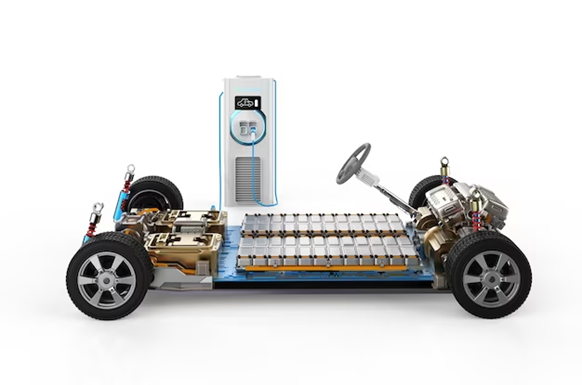Electrical and Hybrid Cars
At PHILLY-TECH, students will learn how electric motors function in electric vehicles and how to maintain them. In contrast, students will learn about Hybrid electric vehicles which are powered by an internal combustion engine and an electric motor and use energy stored in batteries. Students will learn how the battery is charged through regenerative braking and by the internal combustion engine. Students will also learn how a hybrid automobile uses a mix of fuel and electric power to combine propulsion in order to provide increased fuel performance. The advantages of a hybrid motor include comparatively less fuel usage and reduced Carbon Dioxide emission and more environmental than traditional gasoline or diesel-engine vehicles.
This program is designed to provide students with the knowledge and skills required to diagnose, repair, and maintain electrical and hybrid vehicles

Diploma in Agriculture Commodities Management
Trimester 1:
AUTTEC 100: Introduction to Automotive Technology
- Introduction to automotive industry and its history
- Vehicle types and classifications
- Basic automotive terminology and safety procedures
AUTENG 100: Engine Systems
- Internal combustion engines
- Engine components and systems
- Engine performance and maintenance
AUTELEC 100: Basic Electrical and Electronics
- Introduction to electrical systems in vehicles
- Ohm’s law and electrical circuits
- Basic electronic components and troubleshooting
AUTTOQ 100: Tools and Equipment
- Introduction to automotive tools and equipment
- Proper tool usage and safety
- Basic tool identification and selection
AUTSHOP 100: Workshop Practices
- Safety procedures in an automotive workshop
- Proper vehicle lifting and support
- Shop organization and cleanliness
Trimester 2:
AUTHYB 100: Hybrid Vehicle Fundamentals
- Understanding hybrid vehicle technology
- Hybrid vehicle types and configurations
- Environmental and fuel efficiency benefits
AUTHVOL 100: High-Voltage Electrical Systems
- Introduction to high-voltage systems
- Safety measures and precautions
- Handling high-voltage components
AUTHYB 101: Hybrid Vehicle Components
- Hybrid system components (battery, motor, inverter)
- Understanding hybrid drivetrains
- Identifying hybrid components in vehicles
AUTHYB 102: Hybrid Vehicle Diagnostics
- Diagnosing common hybrid vehicle issues
- Using diagnostic tools and software
- Troubleshooting hybrid-specific problems
Trimester 3: Advanced Electrical and Hybrid Vehicle Systems
AUTEV 100: Electric Vehicle (EV) Technology
- EV basics and classification
- EV powertrains and charging systems
- Safety considerations for EVs
AUTEHB 100: Electric and Hybrid Vehicle Batteries
- Battery types and chemistries
- Battery maintenance, testing, and replacement
- Battery reconditioning and recycling
AUTDT 100: Advanced Diagnostic Tools
Using specialized diagnostic equipment
Reading and interpreting diagnostic codes
Data logging and analysis
AUTEHM 100: Electric and Hybrid Vehicle Maintenance
- Routine maintenance procedures
- Inspecting and servicing high-voltage components
- Software updates and calibration
Trimester 4:
AUTJOB 100: Practical Training and Internship
- Hands-on experience in diagnosing and repairing electrical and hybrid vehicles
- Practical exercises in a controlled workshop environment
- Placement in an automotive service center specializing in electric and hybrid vehicles
- Gaining real-world experience in repairing and maintaining these vehicles
- Supervised by experienced professionals
Final Assessment and Certification
- Evaluation of the student’s performance during the internship
- Successful completion of the program leads to the award of the Diploma in Electrical and Hybrid Cars Technician
In addition, students will also receive training in soft skills such as communication, customer service, and teamwork. The curriculum will be regularly updated to keep up with the evolving technology in the automotive industry. and are encouraged to stay informed about emerging technologies in the field.
Students have to contact the school administration if they want to take extra credits or transfer credits to pursue the Diploma Certificate or Associate of Applied Science (A.A.S.) Degree in their field of interest. Students will select required number courses in each of the areas listed to meet general education requirements graduation for the A.A.S. Some of these courses can be transferred directly from and to the university system and may be substituted for recommended courses on the outline. Students should speak with an advisor before doing so these selective courses are required for all students.
- Selected Communication Course (Choose two for Diploma or three for the Associate)
ENGL 100: Fundamentals of Speech
CPL 100: Career Planning
CPL 101: Communications and Career Strategies
ENGL 101: Composition
ENGL 102: composition
- Selected Mathematics Course (Choose two for Diploma or three for the Associate)
MATH 100:General Math
MATH 101:Intermediate Algebra
MATH 102:College Algebra
- Selected Social Science Course (Choose two for Diploma or four for the Associate)
ECON 105:Leadership
ECON 101:Principles of Microeconomics I
ECON 102:Principles of Macroeconomics II
SOC 101:Introduction to Sociology
PSYC 101: Introduction to Psychology
HIST 101: History
